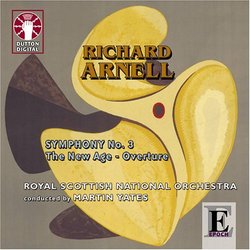| All Artists: Richard Arnell, Martin Yates, Royal Scottish National Orchestra Title: Richard Arnell: Symphony No. 3; The New Age - Overture Members Wishing: 0 Total Copies: 0 Label: Dutton Labs UK Original Release Date: 1/1/2006 Re-Release Date: 6/13/2006 Album Type: Import Genre: Classical Style: Symphonies Number of Discs: 1 SwapaCD Credits: 1 UPC: 765387716127 |
Search - Richard Arnell, Martin Yates, Royal Scottish National Orchestra :: Richard Arnell: Symphony No. 3; The New Age - Overture
 | Richard Arnell, Martin Yates, Royal Scottish National Orchestra Richard Arnell: Symphony No. 3; The New Age - Overture Genre: Classical |
Larger Image |
CD Details |
CD ReviewsNobility and heroism from an earlier age Rex Barron | New Mexico, USA | 07/10/2006 (5 out of 5 stars) "Arnell is new to me, although English symphonies from the first half of the 20th century are among my very favorite things in life. This is, quite simply, one of the greatest "war" symphonies ever written--broad, sweeping, triumphant and elegiac, with superb writing for the brass. One of those pieces that makes you glad to be alive, even with the tears." Interesting war-time symphony... Douglas M. May | 07/20/2007 (3 out of 5 stars) "I'm a sucker for English 20th century music. I would rather listen to Rubbra or Simpson than Dmitri Shostakovich any day of the week--at least in the realm of symphonies. So I was excited when I read that the symphonies of Arnell were finally going to be recorded, and that the gigantic and problematic 3rd would be the first in the project. I had hoped that Arnell would prove to be a major re-discovery, much as George Lloyd had been in the 1980's. And he may in fact yet prove to be. There is much in this work that commands admiration and respect--from the clean, if rather stolid, orchestration, to the contrapuntal mastery evidenced by the fugato in the finale. Yet the overall impression with which I am left is of a young composer with a great deal of technique at his disposal but not a great deal to say. There are some nice tunes (curiously for 1945, Arnell's diatonicism in this symphony sounds more like a poignant attempt to channel the pre-WWI optimism of Elgar than what Vaughan Williams captured in the hard-won optimism of his 5th) and some well-prepared and effective climaxes, but too much of the interim consists of grey and static patches of string writing set off against endless chromatic noodling with the motto theme which dominates the whole symphony. Doubly disappointing in that this symphony is a direct outgrowth of the composer's war experiences (his mother died in the blitz) and perhaps his most personal work. VW in his great 4th Symphony captured the horror, heartbreak and resolve of the British people during WWII in a way that this work can only hint at. Sir John Barbirolli proposed some substantial deletions (especially in the finale) when the work was premiered and I think his instincts may have been spot on--although, in this age of the Director's Cut, it's not surprising that we're given an unedited version in this performance. In my opinion, this could have been a great four-movement symphony of about 40 minutes' duration if the hopelessly banal scherzo and incongruously short fifth movement had been eliminated, the finale cut in half, and some of the transitional passages in the 2nd movement tightened up. The slow movement is gripping in its entirety, and represents the high point of the work. There is enough promise in this early symphony that I will be investigating the rest of the releases in the cycle. But those listeners who are more attracted to the sovereign contrapuntal mastery of Rubbra or icy brilliance of Simpson than to the populism of Vaughan Williams and Malcolm Arnold should treat this one with caution. There is certainly nothing wrong with the sonics, other than an occasional sense of congestion which may be more a reflection of the scoring. And the performance by Martin Yates and the Royal Scottish is as committed and passionate an act of advocacy as any composer could wish. " At last! david bedford | 06/19/2006 (5 out of 5 stars) "About time this symphony was recorded. Arnell is one of Englands finest composers. This symphony,performance and recording is fantastic."
|
